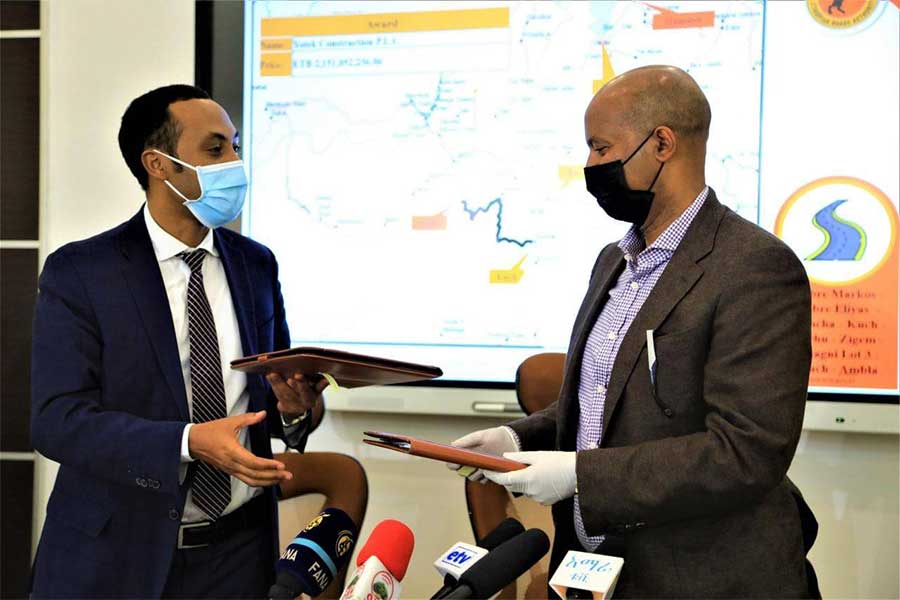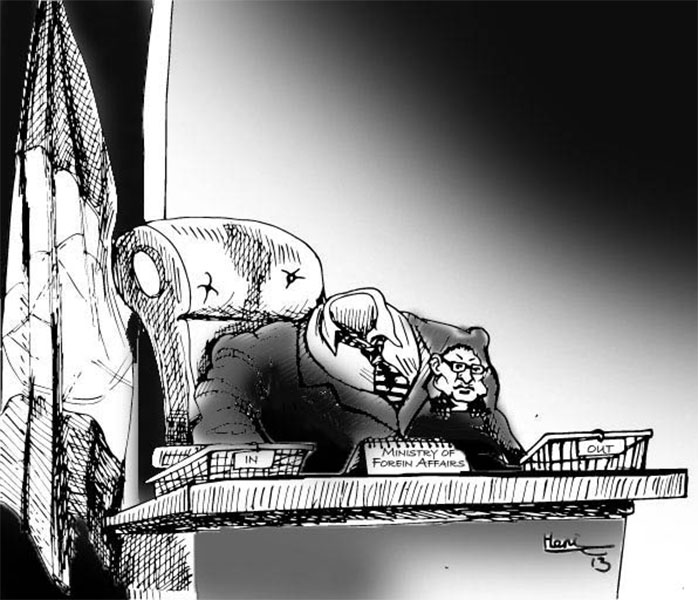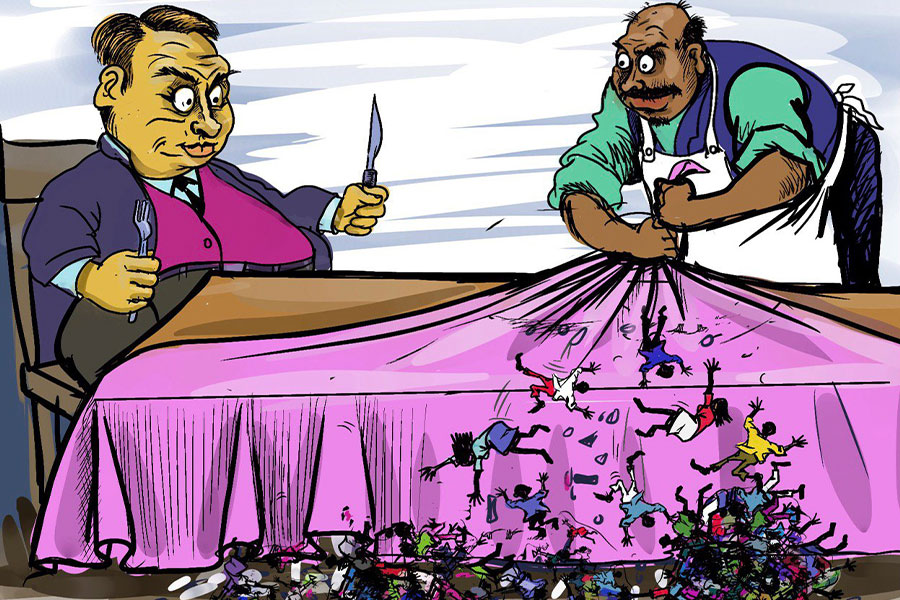
Fortune News | Sep 21,2019
Sengatera, aka the Financial District, is emerging as Ethiopia's Wall Street with many highrise buildings owned by banks and insurance firms dotting the boulevards.
Some of the buildings have reached the finishing stages, while the others are still undergoing construction of the foundation or structural features, giving the area a quite impressive view.
Almost all of the buildings are constructed or are under construction by Chinese contractors, with very few contracts going to local construction companies.
Chinese construction companies are popular in Ethiopia. Out of all non-national employees who secure a work permit from the Ministry of Labour & Social Affairs, 53.6pc were employed in the construction sector. In contrast, 19.7pc and 13pc are employed in manufacturing and other services, respectively.
The Ministry issues a work permit, which has to be renewed every three months, for ex-pat employees in the areas that cannot be undertaken by local professionals. The Ministry also requires non-local professionals to train the local people and transfer their knowledge.
Still, Chinese employees dominate the threshold. Between July 2017 and July 2018, the Ministry issued a total of 9,629 work permits for expatriates, of which 5,156 were for construction workers. Out of the total permits, the Chinese have the highest allocation of 61pc.
Though local contractors are not involved in such projects, some local consultancy firms including Eskinder Architect, JDAW Consulting Architects & Engineers and ETG Designers & Consultants are contracted to supervise the headquarter buildings of United, Zemen and NIB banks, respectively.
One of the buildings undergoing construction with the supervision of a local firm is Nile Insurance's headquarters. Wossen Consulting Architects & Engineers is that local firm.
Wossen is supervising the construction of the building, which has 29 storeys and is being constructed by another local firm, Rama Construction, for 240 million Br. Rama is currently working on the finishing work of the building along with China Jiangsu International Economic & Technical Cooperation for 872 million Br.
Most of the local companies are excluded from such kinds of projects, since the technical evaluation is deliberately toughened for local contractors, according to Behailu Hunde, who has more than a decade of experience in the sector and currently works as a project manager at Wossen.
“The technical specifications limit the local contractors from competing in highrise building projects,” Behailu said.
Ameha Sime, president of the Construction Contractors Association of Ethiopia, says that absence of a law that enforces the participation of local contractors and subcontractors has excluded local companies from such big projects. Established in 1991, the Association has 1,750 contractor members with license grades between one to nine.
A bid document prepared by the Federal Public Procurement & Property Administration Agency stipulates that any bidding contractor should provide certificates of execution of previous contracts for a similar size as the new project it is bidding for.
Mesfin Negewo, director general at the Ethiopian Construction Works Regulatory Authority, says that local contractors have some issues with management capacity and ethics.
The Authority was established recently after going through a split with the Ministry of Urban Development & Housing to oversee the health and safety standards at construction sites, as well as the quality of construction inputs and competency in the industry.
"You'll notice their negligence, starting with the fence of the construction site and the value they give to safety," he said. "Even senior contractors have financial constraints to retain senior and skilled manpower."
However, the Authority is working on a legal framework to help the local companies engage in big projects as subcontractors with foreign companies.
Asmerom Weldegerima, a structural engineer with a decade of experience and a lecturer at Addis Abeba University's Institution of Technology, claims that the quality and capacity of local contractors has been declining for the past several years.
Asmerom also says that it is hardly possible to find a senior professional in government construction administrations.
"Because the seniors don't receive equitable compensation, they are less likely to stay for long with their employers," he said.
He further explained that the sector did not get the attention it deserved, adding that when buildings started failing, the approach taken was in making the contractors and the clients have insurance coverage.
"However, it is not a convenient solution. It should be investigated in-depth," he said. “The design should be reviewed before the construction work kicks off.”
Addis Abeba University Institute of Technology, a client representative of the under-construction mega building headquarters of the Commercial Bank of Ethiopia, also claims that it was challenging to find qualified local contractors.
When the work is beyond the institution’s capacity, the management tries to outsource to actors in the local market or from abroad in the absence of local professionals, according to Esayas G. Yohannes, executive director of the Institute.
"When we invite foreign professionals, we also make them provide training to local partners,” Esayas said.
Wind engineering, interior design, facade design, kitchen design and landscaping are the areas that the institution outsources.
Industry players also claim that there is no legal framework that holds designers accountable for defects in construction.
To solve this, consulting engineers and architects should get a license from the Ethiopian Consulting Engineers & Architects Association, according to Bizuayehu Sitotaw, an architect and president of the Association.
“If we're the one who has the power to give licenses," said Bizuayehu, "it would have been easy for us to undertake a serious follow up and revoke their license if they act against professional ethics.”
Mulugeta Ligdi, building inspection and control director at the Addis Abeba Construction Bureau, says that architects change designs of buildings without getting approvals from the Bureau.
“They don’t even let us know when they decide on a design revision, since the fine is only 5,000 Br,” Mulugeta said.
The Bureau also does not have enough human resources for making regular and planned inspections, according to the director.
There is a gap in the client-side failing to communicate with the designer and describe precisely the sort of building they need to be constructed, according to Abdu Jemal, head of construction industry competitiveness at the Ministry of Urban Development & Construction.
"This leads to design revisions on the already ongoing construction," he said.
Abdu also mentioned that due to the procedural gaps, professionals fail to complete the projects within the quality and time specifications.
A study conducted by the Ministry showed that 83pc of the fresh graduates had shown skill gaps. It also found that there is a huge difference in practical skills between new graduates who have spent five years in universities and an uneducated mason who has experience of working on projects.
"This indicates that there is a problem with the education system," Abdu said.
The construction industry employs 51,996 construction professionals and 23,398 design professionals who acquire licenses from the Ethiopia Construction Work Regulatory Authority.
There are 21,824 level four and five college diplomas and advanced university diplomas, 10,343 level two and three college diplomas, and 445 level one college diploma holders among construction professionals registered under the Authority.
The other reason that is mentioned as a cause for the exclusion of local contractors is due to the large-scale infrastructure projects, which are financed through debt. These projects require international procurement systems that demand local companies meet international standards.
"We're giving different training to build the capacity of local companies to meet international standards," Abdu said.
The construction sector is the second largest sector next to agriculture in contributing to the country’s economic growth, having a 63pc share of the country’s capital budget. There are about 2,335 licensed building contractors in the country.
Experts recommend the government draft a directive that places conditions on foreign contractors that enforce a 30pc joint venture share for a local company.
However, this must be supported by professional ethics, according to Abebe Dinku (Prof.), an experienced civil engineer and a lecturer at Addis Abeba University.
Formation of highly specialised subcontractors in a specific construction project will help competent local construction entities come to market, according to the expert.
“It won't be easy to solve the problem without comprehensive research," Abebe said. "The government should collaborate with professional associations to get involved."
Prime Minister Abiy Ahmed (PhD), who attended the opening of the second National Construction Sector Movement that was held at the UNECA last month, pledged that the government is committed to supporting the local contractors to be competitive and play a significant role.
Abiy also stated that the sector should be void of corruption, and local contractors should deliver projects that are up to international standards and stand the test of time.
PUBLISHED ON
Jan 11,2020 [ VOL
20 , NO
1028]

Fortune News | Sep 21,2019

Radar | Jun 14,2020

Fortune News | Feb 06,2021

Fortune News | Dec 05,2020

Fortune News | Apr 09,2022

Editorial | Oct 31,2020

Editorial | May 31,2025

My Opinion | Jul 18,2021

Covid-19 | Apr 04,2020

Radar | May 24,2025

Dec 22 , 2024 . By TIZITA SHEWAFERAW
Charged with transforming colossal state-owned enterprises into modern and competitiv...

Aug 18 , 2024 . By AKSAH ITALO
Although predictable Yonas Zerihun's job in the ride-hailing service is not immune to...

Jul 28 , 2024 . By TIZITA SHEWAFERAW
Unhabitual, perhaps too many, Samuel Gebreyohannes, 38, used to occasionally enjoy a couple of beers at breakfast. However, he recently swit...

Jul 13 , 2024 . By AKSAH ITALO
Investors who rely on tractors, trucks, and field vehicles for commuting, transporting commodities, and f...

Oct 18 , 2025
The political establishment, notably the ruling party and its top brass, has become p...

Oct 11 , 2025
Ladislas Farago, a roving Associated Press (AP) correspondent, arrived in Ethiopia in...

Oct 4 , 2025
Eyob Tekalegn (PhD) had been in the Governor's chair for only weeks when, on Septembe...

Sep 27 , 2025
Four years into an experiment with “shock therapy” in education, the national moo...